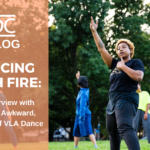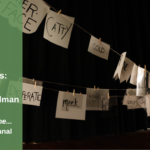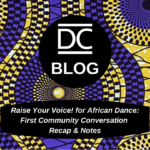Racing into The Dance Complex’s Studio 1 on a Monday evening, I felt immediately swept up into the energy of Sylver Rochelin R.’s ‘Froca Fitness class. What seemed to be class regulars began arranging the room for class readiness, setting up music, lights, cameras, class registration, and making newcomers feel welcome. Everybody was checking in on everybody, hugging, catching up, or starting to get warm. I proudly put myself in the middle of the second row and was quickly humbled by the amount of energy, passion, and steps that surrounded me. The room buzzed as Sylver entered with a contagious smile, ready to lead us through a dynamic fusion of African and Caribbean dance moves. His enthusiasm was palpable, and it was clear that ‘Froca Fitness was not just a workout, but a celebration of culture, community, and the joy of movement. Read on to learn more about Sylver, and the beginnings of ‘Froca Fitness.
CJ Donohoe: I’m curious what led you to Boston, especially being from Madagascar and dancing all around the world, what led you here?
Sylver Rochelin R.: I grew up in Madagascar and lived in Jerusalem for a few years and then moved here with family and landed in Central Square. The Dance Complex was one of my first stops and it helped make me want to start something here!
CD: What made you want to start developing the class in 2018?
SR: I’ve always been into fitness and dance but dance has always been my first love and I’d been wanting to combine the two for the longest time. There are of course dance fitness styles, but I couldn’t find something that actually reflects my culture and retains the spirit of dance at its core. In my years of dancing, I’ve been really focused on traditional Malagasy (from Madagascar) dance, African dance, contemporary dance, and then some hip-hop here and there. I just wanted to put them all together in a compact format and share that with people, which is why I decided to start something like this.
CD: You can totally see the different genres woven together, it’s really special. How have you seen the class develop and change over the six years, from those first couple of classes to now, the class that we just did, or the other community events you’ve done throughout the city? 
SR: It started really really slow, with small classes mainly from people who came to my other classes. But I just kept on teaching class and spreading the word and slowly, ‘Froca started to grow. I am constantly developing new choreographies as I rotate songs in and out of my playlist. More important than the size of class growing, it has been so meaningful to me to watch the community grow and to see people experiencing their own culture within ‘Froca as well as experiencing new cultures. I’m just really happy with where ‘Froca is right now, and looking forward to what the future holds.
CD: Where did the name, ‘Froca Fitness, come from?
SR: ‘Froca comes from the words “African and Caribbean.” It combines them – “aFRO-CAribbean.” The syllable ‘oca’, you hear a lot in all kinds of dance in Africa and the Caribbean like Soca and Goca so I like that sound. Basically, it’s just the combination of the words African and Caribbean.
CD: I’m curious what it looked like to spread the word about ‘Froca Fitness.
SR: It took a long time, just teaching classes everywhere I could. The first time I asked The Dance Complex if I could teach here, I got rejected, but no one knew about ‘Froca back then! So I tried to make the name known and started to build a reputation. And finally, I got accepted to teach at The Dance Complex, and then everything really started from there. What I really wanted was a home for ‘Froca, and I found it here.
CD: What made you want specifically The Dance Complex to be a home for ‘Froca?
SR: It’s just the diversity – ethnic, racial, ability, sexual/gender identity, age, size etc. – that you see here. It’s very diverse and booming with culture and a sense of supportive community. It’s just perfect for ‘Froca.
CD: How did you first learn about The Dance Complex?
SR: I moved to the area and took a class here and fell in love with the place. When I started conceiving of ‘Froca, I searched online where I could take ‘Froca in the Boston area and thought of The Dance Complex.
CD: Do you remember the first class you taught at The Dance Complex?
SR: I said I started small but thankfully I had recruited a few people along the way. I was able to get seven to ten people when I first started. People were very much like, “What is this?” When you take ‘Froca for the first time, it is very overwhelming, there’s a lot going on, no one tells you anything, you just have to do it. But that’s the mentality, don’t think too much, just dance. Do what you can, and you’ll get it eventually. That’s the thing with ‘Froca, it’s a lot of repetition. The more you come, the more you get used to it, the style, the music, and the energy overall, and you build your stamina.
CD: I was hearing that a lot in the studio during class from regulars to newcomers saying, “Don’t worry, the more you come, the more you will get.” For me, the most amazing part of class was the first 60 seconds when everybody came in, putting the camera, lights, and sound together, it was such a team. I’m interested in who is coming to class, and who’s popping in every so often, there definitely seem to be regulars and people that you lean on, people leading different sections especially when we face different walls. Who are the people in the ‘Froca family and who comes to class?
SR: There are definitely some regulars and they have been coming for many years. I took a few of them and actually trained them to be able to teach a class. All my subs are my students. Whenever I split the room, for example, they are there and I can count on them. They are usually in the front row, and sometimes I will ask them to be in the back, just to be in the crowd to bring that energy. I have regulars for sure, and of course, the total newbies come and become regulars. It’s just really welcoming, and everybody is welcome, no matter your level, if you are really strong, if you have an injury, no one will look at you in any way no matter what. It is so special seeing people be welcomed by each other and I am grateful to the ‘Froca community for that!
CD: It was really amazing to see smiling up until the very end, the last second, sweating, tired, but smiling up until the end.
SR: For me, it’s really spreading the joy of dance because that has been always so vital in my life. Dance has always kept me standing despite everything around me. Happy, bad, sad, anything, dance was always the one thing that was there. I want to share that with everybody and bring that joy. 
CD: Do you find that people who come to class are dancers outside of ‘Froca?
SR: Not at all, rarely any dancers, though of course some! We have doctors, students, engineers, artists, people working in the service industry, people from the tech world… everything! I think they understand that moving your body through dance has such a good benefit for your health, for your mental health, and for your overall well being.
CD: What is your dream for ‘Froca, as it expands and continues?
SR: I would like to be able to extend it across the US. Specifically, I would like to take it to Austin, Texas. I have some family and friends there and was part of the African Dance community for a while. I have given classes in Florida and DC, but mostly just workshops, and one-time things, but I would love to have an instructor there that can spread the joy. Within the Boston area, I’d also like to keep accessing more and more communities from the African Diaspora.
CD: It’s also a great way to bring dance to people who would have never known about The Dance Complex or different dance spaces in different cities. How do you envision the future of dance, arts, and fitness in Boston, and what role do you see The Dance Complex playing in that future?
SR: I’m thinking about expansion, making dance and fitness accessible to everybody, even people who think they can not dance. I remember when I started my first year, I had this lady that usually came every time, and was in the first line. She was 70 years old. She was there and loved to move her body and loved the music. I just don’t want any barriers to that kind of feeling to anyone. I want to expand dance through the whole state, having festivals and parties where people can just enjoy dance.
CD: What does accessibility mean for you in a dance space?
SR: I would like to give more free outdoor classes that are open to everybody – money shouldn’t prevent people from enjoying dance. I have been doing that, but it would be nice to have that more often. Also, having more indoor space, for the winter times, to keep up free classes for the community. I also want to make sure that students with varying levels of ability are able to enjoy ‘Froca and so I always try to ensure that people move whatever they can, if they can, however they can, and love themselves for doing it!
CD: Is there anything else you want to share?
SR: Come to class! You are always welcome. Monday, Wednesday, and Saturday, I’m here.
You can learn more about Sylver, ‘Froca Fitness, and how to take class, which takes place on Mondays and Wednesdays at 6:30 and Saturdays at 12:30 at The Dance Complex, here. Stay tuned for more information on our free outdoor class series in August and September.





